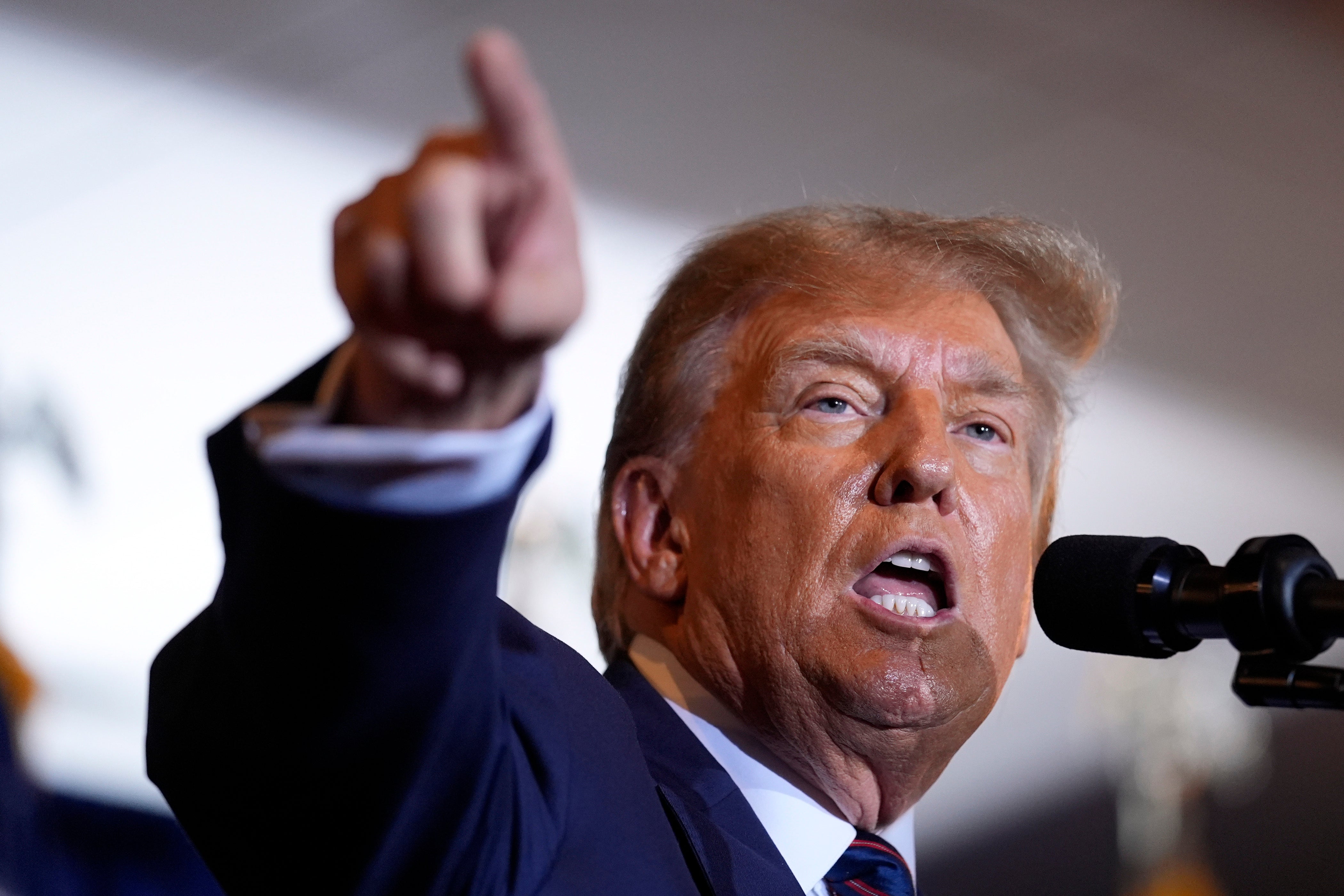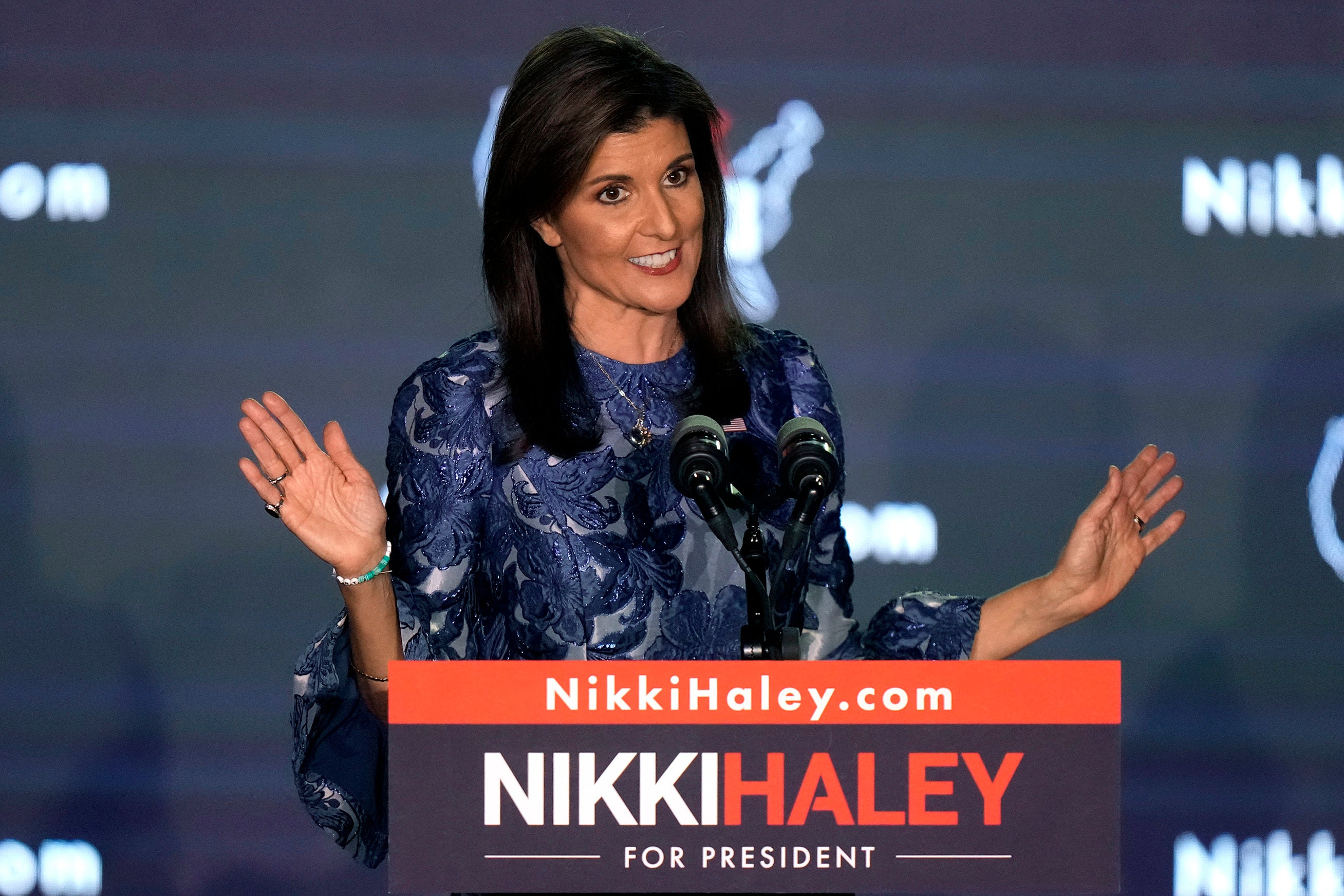The world is already in Trump-induced chaos. Prepare for things to get worse
Ahead of the November election, America and Europe have been sent a clear and present warning about the dangers of a second Trump presidency. But, writes Dr Leslie Vinjamuri, world leaders still have a chance to influence things for the better

Fear struck across Europe, a continent that is home to more than 746 million people, as just over 300,000 people turned out to vote in a small state in the upper northeast corner of the United States and delivered a resounding 11-point victory (a lead of just over 36,000 votes) for former president Donald Trump. With the result in the New Hampshire primary contest, the hope that Nikki Haley could turn the tide and bring a degree of normalcy back to the Republican Party quickly collapsed.
Moderate Republicans, Democrats, independents and America’s closest allies in Europe and Asia had been watching this picturesque New England state to see if voters would catapult Haley into being a serious contender for the Republican nomination. In a high-stakes election that could have a dramatic effect on democracy in the United States, and for long-standing US global commitments on everything from climate change to Europe’s security, the defence of Ukraine, and US security commitments to both South Korea and Japan, there is no shortage of onlookers.
The departure first of the former New Jersey governor Chris Christie, then of Florida governor Ron DeSantis, left Haley and Trump in a head-to-head race in a state known for delivering upsets. The New Hampshire GOP electorate is less conservative, less evangelical, and more moderate than either Iowa or South Carolina. Primary rules that allowed independents to vote in the Republican primary also led several high-profile Republican donors to seize this opportunity and back Haley’s campaign.
Trump’s ire at Haley’s announcement that she would stay in the race was aired across America’s television screens in a speech marked by contempt and scorn for his rival. The following day, Trump announced on his Truth Social account that “anybody that makes a ‘Contribution’ to Birdbrain, from this moment forth, will be permanently barred from the MAGA camp”.
On Thursday, the Republican National Committee announced it will meet this coming week to vote on a resolution that would see the party declare Donald Trump the ‘presumptive 2024 nominee’. This is designed to effectively bring primary season to a close and focus the race on Biden and Trump in what now looks for all practical purposes set to be a very long general electoral season with Donald Trump dominating the airwaves.
The extent to which New Hampshire upset the former president and unleashed his vitriol is telling. Trump was bound to be provoked by a female rival that dared challenge him. But Haley had also been on the ballot in Iowa. New Hampshire revealed a deeper problem for Donald Trump and his prospects for re-election, even if his path to the nomination looks very likely.
Trump’s base includes white voters without a four-year college degree, a powerful but steadily shrinking demographic that gives the former president a narrow path to a November victory over Biden. Given that many non-white Americans view Trump as racist and many also view him as sexist, losing 41 per cent of the vote in a Republican primary to an Indian-origin female contender was bound to be dispiriting. It also signals that a Trump victory in November, if he is the candidate in the November election, is very far from obvious. More than 60 per cent of Nikki Haley’s independent voters said they would either stay home on election day or vote for President Biden.

If he does succeed though, what should the US and the rest of the world expect?
Trump has already said, in a video released on Truth Social, that he plans to root out permanent bureaucrats that comprise the US executive branch to rid the US of what he often refers to as the “deep state”.
He wants to turn civil servants into expendable employees, relocate entire federal agencies to areas where “patriots” would have access to jobs, and set term limits for members of Congress. What might in a period of normal politics include some proposals that merit debate, instead look set to ensure that loyalty and ideology are prerequisites for government service in a second Trump term.
Trump’s divisive rhetoric is fuelling Make America Great Again (Maga) Republicans far beyond Washington. In the 24 hours following the New Hampshire result, the politics of immigration at the US Southern border have gone into overdrive.
Greg Abbott, governor of Texas, declared that he would disregard a US Supreme Court ruling that would allow federal US Border Patrol agents to remove razor-wire fencing that had been placed along the Texas border to deter illegal crossings. Trump turned to his social media outlet to call for the Texas state national guard to overthrow federal border control.
The effects of this Trump-induced chaos are sadly not containable. They have already disrupted US foreign policy at a time when the rest of the world is poorly prepared for nearly 10 months of Trump campaigning, let alone a potential victory.
The most worrying feature of the next 10 months will be the uncertainty that America’s partners and allies will be subjected to. The stakes for Europe, especially, couldn’t be higher. Trump’s reaction to the New Hampshire primary has already directly impacted the congressional debate. The signals are mixed. On Wednesday, the Senate Committee on Foreign Relations advanced legislation allowing the US to seize frozen Russian assets to help pay for Ukraine’s reconstruction. It is a controversial proposal that has been heavily debated but would help close a widening gap on the practical matter of financing for Ukraine.
But on a more immediate dilemma, the rush towards Trump’s nomination has already unsettled Republican lawmakers regarding support for the $100bn bill combining border security, with $60bn assistance for Ukraine, and also security assistance for Israel and Taiwan. Mitch McConnell, the Republican senator and minority leader, prevaricated on a deal he had previously backed as Trump’s likely nomination injected uncertainty into the realm of US global commitments. Trump and his allies were calculating the political advantage he could amass by holding off border security funding, allowing chaos to mount on the Southern border, and blaming Biden.
Even if the current spending package is passed, which still seems likely, Europe’s confidence will be fundamentally shaken. So it should be. Trump has threatened to pull the US out of Nato and to cease US military assistance to Ukraine. Some leading scholars and commentators rightly note that even a second Biden presidency could see the US take a more measured approach to Ukraine and so the difference between Biden and Trump would be slight.
But this view radically underestimates the destabilising effect a bombastic president would have in a war zone that borders Nato’s perimeters. It would immediately raise the stakes for Europe’s ability to mobilise military assistance for Ukraine, and to offer bilateral security guarantees to Ukraine. And it would send a chill down the spines of those Europeans over how to provide for their own states’ security. There is no doubt that Europe needs to step up, but there are more serious and effective ways to force change than through intimidation and threat. When it comes to diplomacy, style matters.
Some also argue that neither Biden nor Trump will alter America’s basic position in the Middle East, which rests on the bedrock of support for Israel and deterrence of Iran. The charge of hypocrisy emanating from the global south has escalated with Biden’s response to the war in Ukraine and Israel. Trump’s anti-immigration rhetoric will take this to a new level and the effort by Biden to work with the G7 to deliver a values-based alternative for the developing world that can compete with China’s Belt and Road Initiative is sure to stall.

Trump has also toed a careful line on globalisation, striving to be the candidate that can deliver a robust economy by cutting taxes and deregulating the economy. He has also promised to slap a 10 per cent tariff on all goods entering the US and will double down on his America First, anti-globalist agenda. This will be a problem for American consumers, a frustration for its businesses, and a headache for Europe, Asia, and much of the rest of the world.
No one knows, possibly not even the former president, which among these proposals would prove to be bluffs. That is the point. It is the sheer uncertainty unleashed even before New Hampshire, that Trump will now take into overdrive.
This has sent a clear and present signal to Americans and Europeans alike that now is the time to prepare. The most powerful supporters of the Republican Party face a choice, whether to hedge against a Trump presidency, or hold firm. Following the 6 January insurrection on the US Capitol, and the former president’s role in it, many donors said they would no longer support president Trump. But choosing to oppose Trump could be a choice with high penalties if the former president is successful in November.
Europe too now faces a choice, whether to prepare for a future where US support is far less reliable or double down on its efforts to secure an unshakable transatlantic partnership. It should do both. The pressure on Europe to increase its defence spending will not disappear and nor should it. The imperative to enhance intra-European cooperation on security and defence is also obvious.
The security environment is unlikely to ease any time soon. So long as there is a prospect of Trump returning to the White House, a man who is inexplicably sympathetic to Vladimir Putin, the Russian president’s incentive to double down on his war efforts will remain strong. In the remaining months before the US elections, Europeans and Americans alike should double down on their commitment to their shared values, most especially, the rule of law, but also the norms of decency, dignity, and decorum.
Europe should reach out to its American counterparts across the pond, but not only in Washington. Americans have always had a blind spot when it comes to understanding the role of foreign countries in contributing to global security, international development and climate change. There is no better time than the present for a concerted public diplomacy campaign that communicates to US state officials, businesses, and voters in Arizona, Georgia, Wisconsin, Nevada, Michigan and Pennsylvania, states that are likely to determine the outcome of the next US presidency.
Europe should also work with the US to build a credible and realistic path to achieving stability in the Middle East, and communicate this to US voters, not least in Michigan. It may seem far-fetched, but America is packed full of university campuses surging with potential young voters who need to be inspired to turn out and vote. The rest of the world has a real opportunity to influence Americans. The ties that bind the US and its European counterparts matter and neither America nor Europe cannot afford to give up on these.
Dr Leslie Vinjamuri is director of the US and Americas Programme at Chatham House and Professor of International Relations at SOAS University of London






Join our commenting forum
Join thought-provoking conversations, follow other Independent readers and see their replies
29Comments